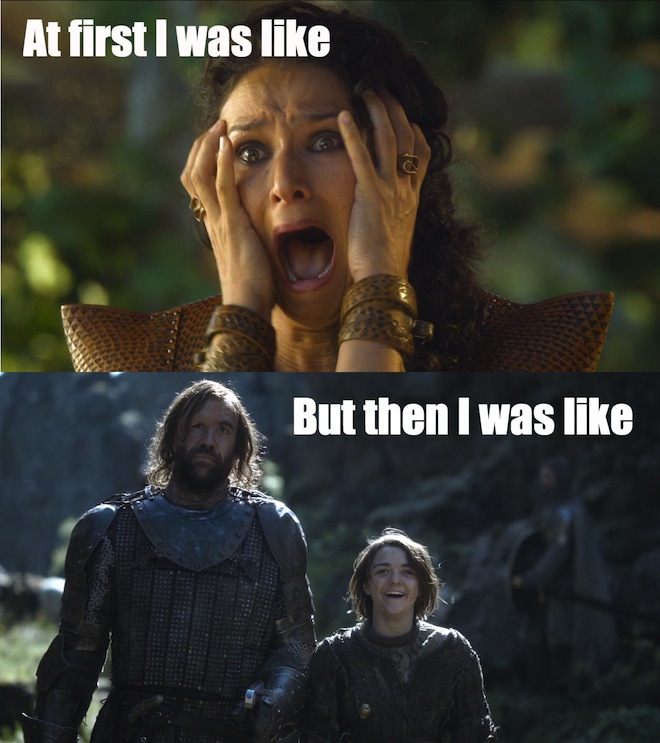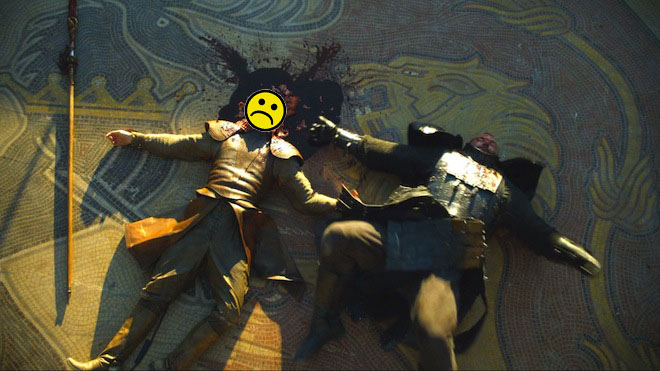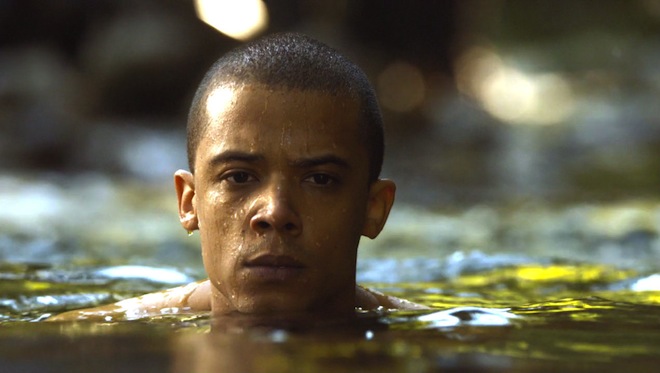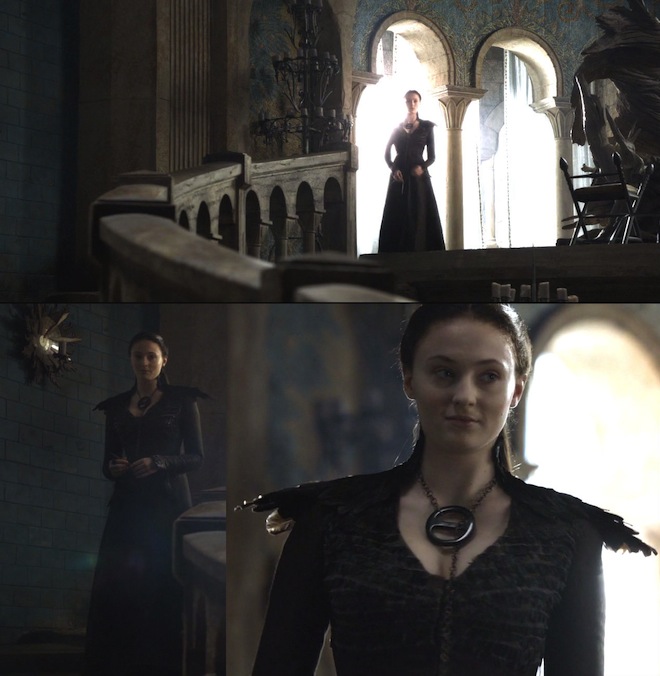Recap: Do You Have The Pillar And Stones To Watch This Week’s Game of Thrones?
So. That was pretty intense. (Spoiler alert.)

I’m disenchanted with Game of Thrones’ increasingly routine use of shocking violence as a climactic device. The innocent outrage when they “killed my n**** Ned” seems so long ago now. Nonetheless, the gory dénouement of this week’s episode had me shouting at the screen, “HOLY SHIT! HOLY SHIT!”
Then I laughed at my own ridiculous reaction.

My other favourite thing about this episode was Daenerys’s cock-and-balls euphemism, “the pillar and the stones”. While Game of Thrones was on hiatus, there’s been much media discussion of toxic masculinity, and I’ve been thinking about gender roles.
Specifically, I’ve been pondering how culture teaches us to associate subjectivity with masculinity, while femininity is about objectification. We learn that men act, and women are acted upon. Assertiveness is gendered masculine, while passivity is gendered feminine. We police these divisions by ridiculing men who behave in ‘unmanly’ ways, and hating women who are ‘unwomanly’.
But we are all human. We have the same capacity for action and feeling. And this week, the Game of Thrones characters who showed their stones (figuratively) were not necessarily the guys with the pillars.
Just look at the Night’s Watch bros, sitting around fretting about their imminent murder by Mance Rayder’s marauders, while king fedora Sam broods about having led m’lady Gilly to the slaughter.
Gilly is fine, as Ygritte instantly recognises when they come face to face at Mole’s Town. Ygritte isn’t sparing the lady with the baby out of feminine tender-heartedness. This is a moment of solidarity between two survivors.
Precious little survives of Theon Greyjoy. Forced to impersonate himself to betray his ironborn kinsmen, his performance is harrowingly precarious. Outside Moat Cailin, the simple question, “Who are you?” silences him for a long, long moment. He looks like he’s about to throw up.
It’s one thing to feel pity or disgust for someone cowering in a kennel, rocking and gibbering. But it’s much sadder to see Reek summoning the ghost of Theon’s old swagger, and only underscoring that it’s gone forever.
Ramsay Snow Bolton didn’t anticipate one thing, though: even when Theon had his pillar and stones, his years with the softhearted Starks had alienated him from Iron Island’s reaving culture. He enjoys no respect among the ironborn — of course garrison commander Ralf Kenning would treat Theon’s suggestion of surrender with scorn.
Yet Kenning has no idea of his devastating accuracy when he sneers: “Only a whipped dog would speak this way — or a woman.”
Theon’s about to get rumbled, and only a swift head-axing by Kenning’s second-in-command keeps Ramsay’s flay-riffic plan on track.
When will Theon finally take the prayer of the Drowned God to heart? “What is dead may never die, but rises again, harder and stronger.” I feel like Elaine Miller from Almost Famous saying this, but it’s not too late for Theon to become a person of substance.
Eunuchs still have it going on. Because what makes a man a manny-man-man? If you’re Grey Worm, it’s probably the titties.
Back in episode four, I was intrigued by the show’s decision to make Grey Worm a more complex character. I’m enjoying his transition from a slave utterly stripped of agency — a mere object for others to use — to a self-determined individual. And what if part of Grey Worm’s journey towards subjectivity is reclaiming the physical desire that was supposed to be brutally stripped from his body?
I’m enjoying the delicacy of Missandei’s and Grey Worm’s interactions, too. Grey Worm has an appealing mixture of stoicism and innocence; his gaze at Missandei’s body seems curious rather than proprietary. She doesn’t shrink from his gaze, but returns it compassionately. Unlike so many others playing the game of thrones, they truly understand subjugation. And they reject it in favour of deliberate respect.
The antithesis of their relationship is Dany’s domination of the pathetically loyal Ser Jorah. She finally discovers he was once Varys’s spy, and in a throne-room kerb-kicking scene filmed in increasingly merciless close-ups, she banishes him from Meereen with dead-eyed calm.
Ser Jorah has long been a pitiful, friendzoned figure. It was almost unbearable to see his craggy face crumple even further, and to hear him finally, humiliatingly admit, “I have loved you…” Too late, guy. He rides sadly away…but will Daenerys’s rejection fester in his heart until it erupts into a depressingly familiar outburst of violent vengeance?
Vengeance drove Oberyn Martell to his death. The Red Viper was a legendary cocksman — and he was pretty nifty with that spear-assisted Dornish capoeira — but he was undone by his determination to force Gregor Clegane into an utter surrender. Instead, it was the Mountain who gave the best head job (sorry/not sorry).

Littlefinger’s masculinity, on the other hand, is sublimated into Machiavellian scheming. (He’s not nicknamed Bigfinger, after all.) The show has always underlined the uncanniness of this fastidious, polite, well-groomed man being a ‘money-lender’ and ‘whoremonger’, and the knights of the Vale certainly sense something weird: “You have foreign blood, don’t you Baelish?”
Braavosi ancestors or not, it seems pretty obvious he pushed Lysa Arryn through the Moon Door. And when Sansa begins to testify, Littlefinger seems doomed. After all, this silly girl who loves chivalry and lemon cakes doesn’t have enough guile to lie… Or does she?
Sansa’s tearful testimony is a masterful pantomime of feminine vulnerability (“He’s been so good to me!”) that only Littlefinger realises is a power play. Later, when he confronts her in her bedchamber, it’s mesmerising to see the power balance shifting beneath their conversation. She says she knows what Littlefinger wants, but does she? A seed of doubt begins to unfurl — has he manipulated her yet again? — until the tiniest smile tugs at her lips.
Littlefinger is weaning Robin from the breast and teaching him to assert himself like a man. (“Take charge of your life for as long as it lasts. That is what it means to be Lord of the Vale.”) But Sansa has become a woman.
Last seen nestled on the soft, grey, wolfy Stark fur on her bed, Sansa now spreads black, glossy wings. She reminds me of Maleficent. Are they falcon’s wings, though, or mockingbird’s wings?
There’s something hard and brittle about Sansa now, too, like the shells of the beetles smashed by Tyrion’s lackwit cousin Orson. Will she be smashed, too? In this world, death is banal and meaningless — as Littlefinger tells Robin, people die on the chamber pot!
Arya has made friends with death, and doesn’t care about the gender-appropriateness of various murdering methods: “I’m not a lady,” she explains.
But other women fear death. “Don’t leave me alone in this world!” begs Ellaria Sand; “My lady wasn’t meant for a world as brutal as ours,” oozes Littlefinger. Valar morghulis — all men must die. So must women.
–
Game of Thrones airs on Showcase at 3.30pm on Mondays, fast-tracked from the US.
–
Mel Campbell is a freelance journalist and cultural critic, and author of the book Out of Shape: Debunking Myths about Fashion and Fit. She blogs on style, history and culture at Footpath Zeitgeist and tweets at @incrediblemelk.
Follow her Game of Thrones recaps here.




